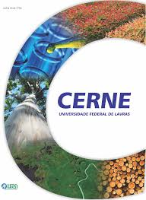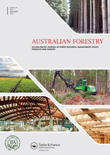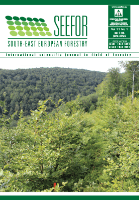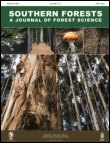
Revista Forestal Mesoamerica Kuru-RFMK
Scope & Guideline
Bridging academia and practice in forest conservation.
Introduction
Aims and Scopes
- Forest Ecology and Biodiversity:
Research on the structural characteristics, floristic diversity, and ecological interactions within various forest ecosystems, including tropical dry forests and urban forestry. - Forest Management and Silviculture:
Studies focused on the management practices, growth performance, and economic viability of different tree species and forest systems, including agroforestry and plantation management. - Technological Innovations in Forestry:
Implementation and evaluation of new technologies such as UAVs, terrestrial laser scanning, and modeling techniques for improving forest monitoring and management practices. - Conservation and Sustainable Use of Forest Resources:
Research aimed at understanding the conservation needs of forest species and ecosystems, including studies on invasive species, forest recovery, and the sustainable use of forest resources. - Socioeconomic Aspects of Forestry:
Investigations into the social perception of forestry practices, economic analyses of forest management systems, and the role of forests in providing ecosystem services.
Trending and Emerging
- Climate Change Impacts on Forest Dynamics:
There is an increasing focus on how climate variables affect forest ecosystems, including litter dynamics and tree growth, highlighting the importance of adapting forestry practices to changing environmental conditions. - Use of Advanced Technologies in Forestry:
The application of UAVs and terrestrial laser scanning in forestry research is gaining traction, allowing for more precise data collection and analysis in forest monitoring and management. - Sustainable Management Practices:
Research related to the sustainability of forest resources, including carbon capture potential and the economic viability of different management systems, is becoming more prominent, reflecting a global shift towards sustainability. - Integrative Approaches to Forest Ecosystems:
Emerging studies that integrate ecological, social, and economic indicators to evaluate the sustainability of forestry practices indicate a trend towards holistic forest management strategies.
Declining or Waning
- Traditional Forest Products and Uses:
Research focused on traditional uses of forest products and practices, such as fire management and local species uses, has decreased, possibly overshadowed by more modern approaches to forest management. - Pest and Disease Management in Forest Nurseries:
While still relevant, the frequency of studies addressing pests and diseases in forest nurseries has diminished, indicating a potential shift towards broader ecological studies rather than specific management issues. - Historical Forest Practices:
Research exploring historical practices in forestry and their implications has waned, potentially due to a stronger emphasis on contemporary issues and sustainable practices.
Similar Journals

Cerne
Pioneering Research for the Future of ForestryCerne is a distinguished open-access journal dedicated to advancing knowledge in the field of forestry, published by the Universidade Federal de Lavras (UFLA). Since its inception in 1994, the journal has actively contributed to the global discourse on sustainable forest management and biodiversity conservation, presenting research findings that are both relevant and impactful. With its ISSN 0104-7760, Cerne aims to foster collaboration among researchers, professionals, and students, enhancing the understanding of forestry practices in Brazil and beyond. As of 2023, it holds a respectable Q3 ranking in the forestry category, further cementing its position within the academic community, illustrated by a Scopus ranking of #97 out of 174 in the Agricultural and Biological Sciences - Forestry field. Operating under an open-access model allows for wide dissemination of research outputs, ensuring that critical findings reach a broad audience, fueling further innovation and discovery in the field. With converged years extending from 2007 to 2024, Cerne continues to be a vital resource for anyone engaged in forestry research and practices.

Madera y Bosques
Exploring the Depths of Wood ScienceMadera y Bosques is a prominent academic journal specializing in the fields of forestry and wood science, published by INST ECOLOGIA A C in Mexico. With an ISSN of 1405-0471 and an E-ISSN of 2448-7597, it has established itself as a vital platform for disseminating research findings, innovative practices, and methodologies pertinent to sustainable forest management and ecological conservation. Operating since 2008, the journal covers a wide scope of topics related to the complexities of forest ecosystems, the importance of biodiversity, and the challenges posed by climate change. Despite its categorization in Q4 for the year 2023 in the Forestry category, Madera y Bosques aims to elevate discourse and practice in the field, providing a voice to emerging researchers and seasoned professionals alike. Additionally, the journal adheres to open access principles, enhancing the visibility and accessibility of its articles to a global audience. Researchers and practitioners are encouraged to engage with its rich content to further their understanding and impact in the world of forestry.

BOSQUE
Advancing Sustainable Forestry KnowledgeBOSQUE, published by Universidad Austral de Chile, Facultad de Ciencias Forestales, stands as a pivotal platform for advancing the field of forestry and related environmental sciences. With an ISSN of 0717-9200, this journal has been committed to disseminating original research, reviews, and case studies essential for understanding forest ecosystems and management practices since its inception in 2006. As of 2023, it holds a Q3 ranking in the forestry category, showcasing a significant yet developing influence in the broader academic landscape, evidenced by its Scopus ranking placing it at the 12th percentile in Agricultural and Biological Sciences - Forestry. While boasting a diverse range of articles, BOSQUE promotes open access to a growing community of researchers, professionals, and students eager to contribute to sustainable forest management and conservation efforts. The journal continues to foster critical dialogue and innovation, making it an invaluable resource for those dedicated to enhancing forest sciences.

Journal of Forest Science
Advancing forest knowledge for a sustainable future.Journal of Forest Science, published by the Czech Academy Agricultural Sciences, serves as a pivotal resource in the field of forestry and soil science. With its ISSN 1212-4834 and E-ISSN 1805-935X, this Open Access journal has been delivering insightful research since 2003, making knowledge freely available to researchers and practitioners globally. Hailing from the Czech Republic, the journal has established a notable impact within the academic community, as evidenced by its placements in the Q2 quartile for Forestry and Q3 for Soil Science according to the latest rankings. This positions the Journal of Forest Science favorably within academic discourse, ranking #73 out of 174 in Forestry and #84 out of 159 in Soil Science on Scopus, placing it at the 58th and 47th percentiles respectively. Covering a wide range of topics that intersect with environmental sustainability, forest management, and ecological research, the journal aims to foster innovation and collaboration within the scientific community. Researchers, professionals, and students can access published articles easily, bolstering the advancement of knowledge in forest science and its related disciplines.

JOURNAL OF TROPICAL FOREST SCIENCE
Pioneering Research in Tropical Forest ScienceThe JOURNAL OF TROPICAL FOREST SCIENCE, published by the FOREST RESEARCH INST MALAYSIA, serves as a vital platform for disseminating research focused on tropical forestry. Since its inception in 1988 and transitioning to its current form in 1993, this journal has established itself within the academic community, currently holding a commendable Q3 ranking in the Forestry category, as per the 2023 metrics. With an ISSN of 0128-1283 and E-ISSN 2521-9847, it provides crucial insights into the ecological, economic, and social aspects of tropical forest management and conservation, making it an indispensable resource for researchers, practitioners, and students alike. Although it does not operate under an open-access model, the journal emphasizes quality and relevance in its publications, contributing significantly to the ongoing discourse in agricultural and biological sciences with a Scopus rank of #89 out of 174 and a 49th percentile position.

Forestist
Empowering voices in forestry research and practice.Forestist, published by AVES, is a pivotal open-access journal dedicated to the field of Forestry, providing a platform for researchers, professionals, and students to explore cutting-edge developments and research within the discipline since 1980. Operating from Turkey, this journal offers a unique opportunity for scholars to share their findings with a broad audience, contributing to the global discourse on sustainable forest management, conservation practices, and ecological research. With an impressive impact factor and a current categorization in the Q3 quartile for 2023, Forestist ranks among the essential resources in Agricultural and Biological Sciences, particularly within the realm of Forestry, as indicated by its Scopus ranking of #119 out of 174 journals. This publication is committed to fostering open access to knowledge, making research freely available while encouraging innovative studies that address the pressing challenges in forestry and environmental science.

Central European Forestry Journal
Exploring the depths of Central European forestry science.Central European Forestry Journal, published by SCIENDO, is a pivotal platform dedicated to advancing research and knowledge in the field of forestry. Since its inception in 2009, this Open Access journal has provided scholars and practitioners with unrestricted access to cutting-edge research findings, promoting collaboration and innovation within the forestry community. Based in Poland, the journal serves as a crucial resource for researchers, professionals, and students alike, addressing critical topics relevant to the management, conservation, and sustainable utilization of forest resources. The journal holds a commendable Q2 ranking in Forestry, with a notable rank of 51 out of 174 and a 70th percentile in Scopus's Agricultural and Biological Sciences category. With converged publication from 2017 to 2024, the Central European Forestry Journal represents an essential avenue for disseminating knowledge and fostering dialogue in an increasingly important field.

AUSTRALIAN FORESTRY
Connecting Research with Real-World ImpactAustralian Forestry is an esteemed journal dedicated to advancing knowledge in the field of forestry and related environmental science. Published by Taylor & Francis Australia, this journal plays a pivotal role in disseminating high-quality research that spans various aspects of forestry, including sustainable management, conservation practices, and policy analysis. With an impact factor reflecting its significance in the academic community and a Scopus rank of #44 out of 174 in the category of Agricultural and Biological Sciences, Australian Forestry proudly holds a Q2 ranking in its field as of 2023. The journal has maintained a continuous publication record since its inception in 1936, with a commitment to addressing contemporary challenges within forestry. Researchers, professionals, and students alike are invited to engage with this vital resource that fosters insightful dialogue, innovative solutions, and a deeper understanding of forestry science.

SEEFOR-South-East European Forestry
Advancing sustainable forestry practices in South-East Europe.SEEFOR-South-East European Forestry is a premier open-access journal dedicated to advancing knowledge in the field of forestry and environmental science. Published by the CROATIAN FOREST RESEARCH INSTITUTE, this journal has been operational since 2010, providing a platform for research that focuses on the unique forestry dynamics of the South-East European region. With an ISSN of 1847-6481 and an E-ISSN of 1849-0891, SEEFOR is recognized for its commitment to disseminating high-quality research that addresses critical issues in forestry management, conservation, and sustainable development. The journal is indexed in Scopus, placing it within the third quartile (Q3) of forestry journals, reflecting its significance within the academic community. SEEFOR aims to connect researchers, practitioners, and policymakers, fostering collaboration and innovation in fostering sustainable forestry practices in Croatia and beyond. Submissions are welcome in a range of areas including forest ecology, policy development, and socio-economic impacts, making it an invaluable resource for professionals and students alike.

Southern Forests-A Journal of Forest Science
Exploring the Depths of Forest Science and EcologySouthern Forests: A Journal of Forest Science, published by Taylor & Francis Ltd, serves as a vital platform for scholarly discourse in the field of forestry. With a robust ISSN of 2070-2620 and E-ISSN of 2070-2639, this journal highlights cutting-edge research and vital advancements from 2008 to 2024. Based in the United Kingdom, it continues to make significant contributions, evidenced by its current Q3 ranking in the forestry category of Scopus as well as its rank of 94 out of 174 in Agricultural and Biological Sciences. This journal caters to a diverse audience of researchers, professionals, and students, providing access to high-quality articles that promote sustainable forest management and ecological studies. Despite being classified as a non-open access journal, it remains a key resource, ensuring accessibility to crucial information that addresses both local and global forest challenges.